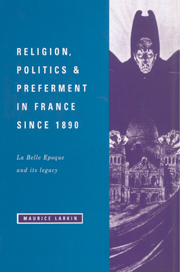Book contents
- Frontmatter
- Contents
- Preface
- Part 1 As it was: Catholics and the Republic, 1890–1914
- Part 2 As it was: Catholics and state employment, 1890–1914
- 4 Problems and principles
- 5 Patterns of preferment: sectors with teeth
- 6 Ronds-de-cuir, genoux-de-chameau: other sectors
- 7 The Brotherhood at work
- 8 Marianne at school
- Part 3 As it became, 1914–1994
- Map: Religious observance in France, c. 1960.
- Notes
- Sources
- Index
6 - Ronds-de-cuir, genoux-de-chameau: other sectors
Published online by Cambridge University Press: 27 January 2010
- Frontmatter
- Contents
- Preface
- Part 1 As it was: Catholics and the Republic, 1890–1914
- Part 2 As it was: Catholics and state employment, 1890–1914
- 4 Problems and principles
- 5 Patterns of preferment: sectors with teeth
- 6 Ronds-de-cuir, genoux-de-chameau: other sectors
- 7 The Brotherhood at work
- 8 Marianne at school
- Part 3 As it became, 1914–1994
- Map: Religious observance in France, c. 1960.
- Notes
- Sources
- Index
Summary
And those who prayed were called ‘camel-knees’ by their companions.
Oratorian sermonPulling the purse strings
The financial sectors of state employment occupied a curiously intermediate position between the technical ministries and the more politicised branches of the French administration. Professional expertise was essential – as was acknowledged in the high hurdles set for intending inspecteurs des finances (see pp. 108–9), and in the rather more modest concours established for central-office staff in 1885. Yet political factors could not be entirely ignored in recruitment and promotion. To some extent this was an inevitable result of the growing interventionism of modern European governments – and of the increasing expenditure and revenue-raising that it entailed. The activities of all other ministries were bound by what the Ministry of Finance was prepared to allow; and it would have been only too easy for a financial staff, hostile to government policy, to raise endless pecuniary objections to what the government intended. Conversely a sympathetic staff knew which ministerial backpockets could be raided to realise a cherished government project – or at least they knew how to massage the accounts to minimise criticism.
As in all ministries in this period, there was a tendency for ministers of finance to bring in as directeurs men with whom they had worked before, often in other ministries or contexts – political cronies, whose views and judgement they considered reliable, but with sufficient financial ability to be able to challenge and override the traditional obstructive habits of an arthritic administration, set in its ways and unable to muster enthusiasm for short cuts to short-term political objectives.
- Type
- Chapter
- Information
- Religion, Politics and Preferment in France since 1890La Belle Epoque and its Legacy, pp. 107 - 118Publisher: Cambridge University PressPrint publication year: 1995



